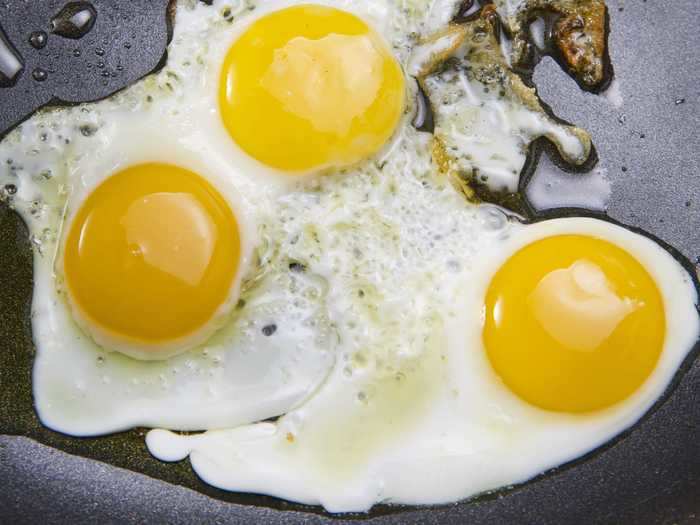Eggs can be prepared a multitude of ways.Lenasirena/Shutterstock
- Americans eat a ton of eggs — 76.5 billion a year, to be exact.
- The shell and yolk colors depend on the hen's breed and diet.
- Eggs may help reverse bad moods and fight fatigue.
Why'd the chicken cross the road?
To get to the other side.
That one always cracks people up. These egg facts, however, are no yolk.
Superb sources of vital nutrients, this unassuming superfood has been a staple of the human diet since the dawn of time, and can be prepared an infinite number of ways.
Here are 10 things you probably didn't know about eggs.
The average American eats around 290 eggs per year.
That's a lot of eggs.
REUTERS/Vasily Fedosenko
Iowa produces the most eggs out of any state in the US.
An egg-packing factory.
Mike Blake/Reuters
The color of the shell depends on the breed of the hen that laid it.
Eggs come in different colors.
Chris Jackson / Getty
The color of the yolk depends on the hen's diet.
Yolk color has nothing to do with freshness.
Shutterstock
The age of a hen affects the size of an egg.
Older hens lay bigger eggs.
Prof foto 101/Shutterstock
Eggs come with a "sell by" date, not an expiration date.
Not an expiration date.
Shutterstock
Two eggs will give you more than enough cholesterol for the day.
An egg and avocado on toast.
Zeleno/Getty Images
With a blend of omega-3 fatty acids, zinc, B vitamins, and iodide, eggs can help reverse bad moods and fight fatigue.
So healthy.
Alexander Spatari/Getty Images
If you're going to eat raw cookie dough, use pasteurized eggs, which are free from any risk of salmonella.
Who doesn't love raw cookie dough?
Sydney Kramer/INSIDER
For the best hard boiled eggs, use eggs that are at least 10 days old.
Peeling a hard boiled egg.
Shutterstock
Fresh eggs will be more difficult to peel.










